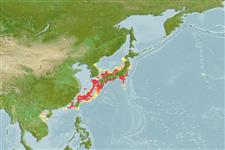Classification / Names
ชื่อสามัญ | ชื่อพ้อง | Catalog of Fishes(สกุล, ชนิด) | ITIS | CoL | WoRMS | Cloffa
sub class Elasmobranchii (ฉลามและกระเบน) (sharks and rays) >
Squaliformes (Sleeper and dogfish sharks) >
Oxynotidae (Rough sharks)
Etymology: Oxynotus: oxys (Gr.), sharp; notos (Gr.), back, referring to its keeled back (“dorso carenato”). (See ETYFish); japonicus: -icus (L.), belonging to: Japan (specifically, Suruga Bay in Honshu), type locality. (See ETYFish).
Environment: milieu / climate zone / depth range / distribution range
นิเวศวิทยา
เกี่ยวกับทะเล,น้ำเค็ม สัตว์หน้าดินในเขตน้ำลึก; ระดับความลึก 150 - 300 m (Ref. 114724). Deep-water
Northwest Pacific: Japan and Taiwan.
ขนาด / น้ำหนัก / Age
Maturity: Lm ? range ? - ? cm
Max length : 54.0 cm TL เพศผู้/กระเทย; (Ref. 114724); 64.5 cm TL (female)
Holotype trawled from a depth between 225 and 270 m (Ref. 31258). Ovoviviparous (Ref. 205).
Life cycle and mating behavior
Maturities | การสืบพันธุ์ | Spawnings | Egg(s) | Fecundities | ตัวอ่อน
Distinct pairing with embrace (Ref. 205).
Yano, K. and M. Murofushi, 1985. A new prickly dogfish, Oxynotus japonicus, from Japan. Jap. J. Ichthyol. 32(2):129-136. (Ref. 31258)
IUCN Red List Status (Ref. 130435)
Threat to humans
Harmless
Human uses
เครื่องมือ
Special reports
Download XML
แหล่งที่มาจากอินเตอร์เน็ต
Estimates based on models
Preferred temperature (Ref.
123201): 1.9 - 16.1, mean 12 °C (based on 8 cells).
Phylogenetic diversity index (Ref.
82804): PD
50 = 0.5625 [Uniqueness, from 0.5 = low to 2.0 = high].
Bayesian length-weight: a=0.00372 (0.00160 - 0.00860), b=3.15 (2.94 - 3.36), in cm total length, based on LWR estimates for this (Sub)family-body shape (Ref.
93245).
ระดับชั้นอาหาร (Ref.
69278): 3.9 ±0.6 se; based on size and trophs of closest relatives
ความสามารถในการกลับคืนสู่ปกติ (Ref.
120179): ต่ำ, เวลาต่ำสุดที่จะทำให้ประชากรเพิ่มขึ้นเป็น 2 เท่าใช้เวลา 4.5 - 14 ปี (Fec assumed to be <100).
Fishing Vulnerability (Ref.
59153): Moderate to high vulnerability (46 of 100).
